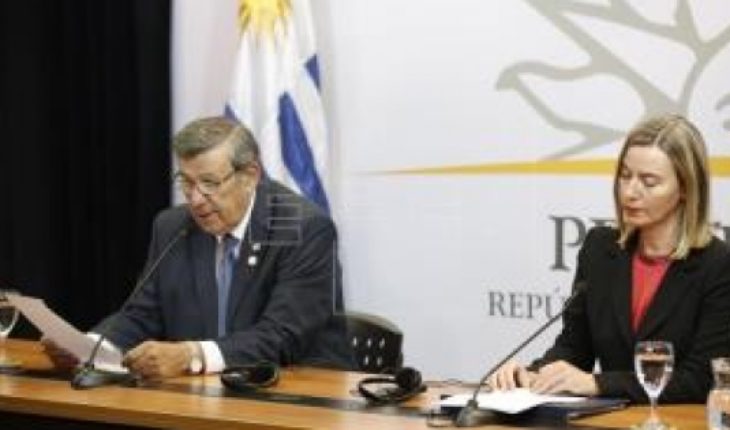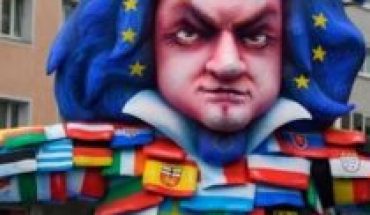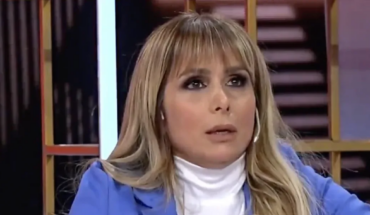After nearly five hours of closed-door discussions, the Foreign Ministers and other diplomats from a dozen European and Latin American countries issued a statement in which realize the “severity of the crisis present in Venezuela and its impact in the region”and the”plight of his people”.
Tension has increased since 23 January the head of the Venezuelan Parliament, Juan Guaidó, proclaim is acting his country’s President to consider illegitimate ruler to Nicolas Maduro after being re-elected in a presidential poll that the opposition cross out “fraudulent”.
This action accelerated Venezuela political crisis, since, in addition, much of the international community, as the United States and several European and Latin American countries, backed guided and pushed for elections will convene.
The contact group undertook to continue to work to “establish the guarantees necessary for a credible electoral process in the shortest possible time”.
It will also work for “allowing the urgent delivery of assistance according to international humanitarian principles”.
To implement both goals, the group “will send a technical mission” to Venezuela and again convene a ministerial meeting in early March to discuss the development of the process.
The Declaration was signed by the European Union (EU), Uruguay, Costa Rica, Ecuador, Spain, Italy, Portugal, Holland, Sweden, Germany, France and the United Kingdom.
Mexico, which does not form part of the contact group but if you participated in the meeting, and Bolivia not signed the final declaration.
The High Representative of the European Union (EU) for Foreign Affairs and security policy, Federica Mogherini, said at a press conference that Mexico and Bolivia “not identified in some parts of the Declaration” but stressed that peace wants to remain part of the Contact group.
After the meeting, the Foreign Minister of Mexico, Marcelo Ebrard, said to the press that his country, “by constitutional mandate” could not support “political interference” in other countries.
“We support what has to do with communication and dialogue between the parties and to a peaceful and democratic way out that excludes the use of force have, but we can not participate in anything that involves that we determine the electoral political process”, Ebrard said.
Created at the end of last January, the group said that it will support a resolution ” peaceful, political, democratic and proper Venezuelan, ” excluding the use of force, through free, transparent and credible presidential election.
Before the objections which guided has shown in the last hours to eventual dialogue with Maduro, the Uruguayan Foreign Minister, Rodolfo Nin Novoa, said that “there is no possible negotiation without dialogue and even the elections have to be somehow agreed” and considered that “refusing dialogue is blocking the possibility of understanding.”
“The solution has to be Venezuelan, because the alternative is chaos, confrontation and certainly can be armed conflict,” he warned.
For his part, the Minister of Foreign Affairs of Spain, Josep Borrell, stressed the importance of a process that will lead to elections.
“We believe, we ask, we support this holding of presidential elections,” said Borrell, who stressed that the Group appeals to “respect the will of the Venezuelan people expressed through elections”.
For the signatories of the Declaration, it is “crucial to restoring full democracy” in Venezuela and constitutional respect for the country’s institutions, more particularly of the National Assembly (Parliament).
The Group stressed that “the fundamental freedoms and human rights of all Venezuelans must be respected” and regretted the deaths and injuries caused by the “excessive use of force”.
Nin Novoa said that participation in this group is open to more actors who want to join in and highlighted the “Confluence” with the so-called “mechanism of Montevideo”, proposed Wednesday by Mexico and Uruguay, an initiative for peace in Venezuela and that It consists of four stages focused on immediate dialogue, negotiations, commitments and implementation.
On the “mechanism of Montevideo”, Mogherini clarified that, although it is not “incompatible”, it has compositions and goals are different from the of the international contact group.
Current members of the group, only three (Bolivia, Italy and Uruguay) not have formally recognized to guided as President of Venezuela.
The meeting in the Uruguayan capital was held with a major security operation in the vicinity of the Executive Tower, headquarters of the encounter, where were mobilized during the midday forces left in favor of mature and “against imperialism” of States United.
translated from Spanish: Contact Group agrees to send mission to Venezuela and pleads for dialogue
February 7, 2019 |





